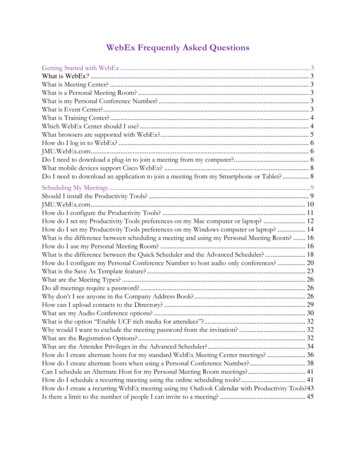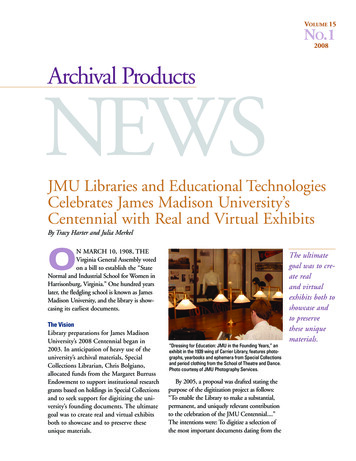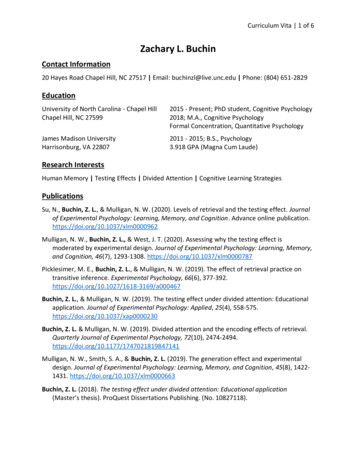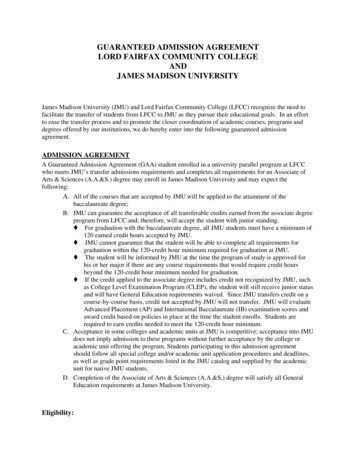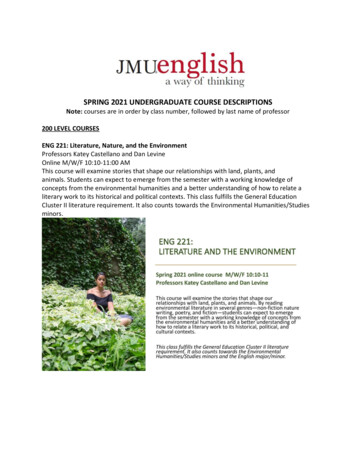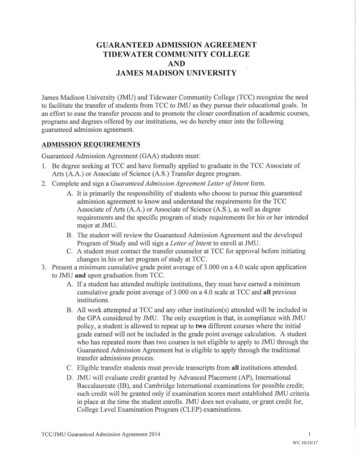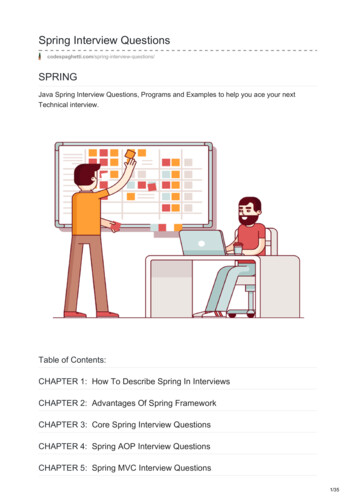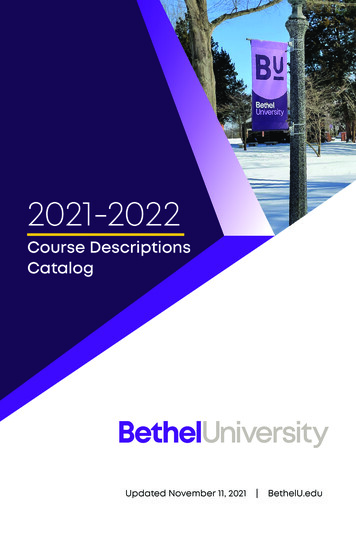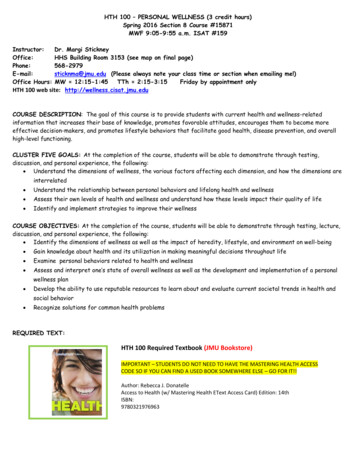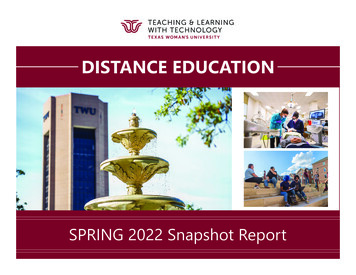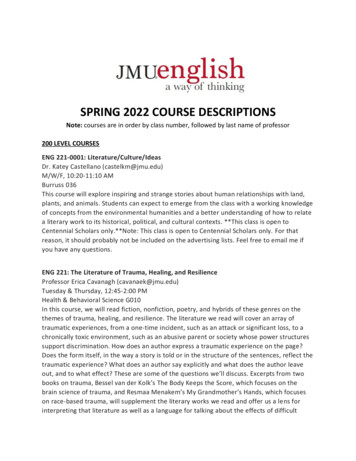
Transcription
SPRING 2022 COURSE DESCRIPTIONSNote: courses are in order by class number, followed by last name of professor200 LEVEL COURSESENG 221-0001: Literature/Culture/IdeasDr. Katey Castellano (castelkm@jmu.edu)M/W/F, 10:20-11:10 AMBurruss 036This course will explore inspiring and strange stories about human relationships with land,plants, and animals. Students can expect to emerge from the class with a working knowledgeof concepts from the environmental humanities and a better understanding of how to relatea literary work to its historical, political, and cultural contexts. **This class is open toCentennial Scholars only.**Note: This class is open to Centennial Scholars only. For thatreason, it should probably not be included on the advertising lists. Feel free to email me ifyou have any questions.ENG 221: The Literature of Trauma, Healing, and ResilienceProfessor Erica Cavanagh (cavanaek@jmu.edu)Tuesday & Thursday, 12:45-2:00 PMHealth & Behavioral Science G010In this course, we will read fiction, nonfiction, poetry, and hybrids of these genres on thethemes of trauma, healing, and resilience. The literature we read will cover an array oftraumatic experiences, from a one-time incident, such as an attack or significant loss, to achronically toxic environment, such as an abusive parent or society whose power structuressupport discrimination. How does an author express a traumatic experience on the page?Does the form itself, in the way a story is told or in the structure of the sentences, reflect thetraumatic experience? What does an author say explicitly and what does the author leaveout, and to what effect? These are some of the questions we’ll discuss. Excerpts from twobooks on trauma, Bessel van der Kolk’s The Body Keeps the Score, which focuses on thebrain science of trauma, and Resmaa Menakem’s My Grandmother’s Hands, which focuseson race-based trauma, will supplement the literary works we read and offer us a lens forinterpreting that literature as well as a language for talking about the effects of difficult
experiences and how we might address them. Toward that end, we will also read and discusstools for healing and resilience.ENG 221-0002Dr. Katey Castellano (castelkm@jmu.edu)M/W/F, 1:50-2:40 PMEnGeo 2301This course will explore inspiring and strange stories about human relationships with land,plants, and animals. Students can expect to emerge from the class with a working knowledgeof concepts from the environmental humanities and a better understanding of how to relatea literary work to its historical, political, and cultural contexts. This class fulfills the GeneralEducation Cluster II literature requirement. It also counts towards the EnvironmentalHumanities/Studies minors and the English major/minor.ENG 222: Ideology and Global CinemasDr. Dennis Lo (lodh@jmu.edu)M/W/F, 11:30 AM-12:20 PMHBS G040This course introduces General Education students to the politics, aesthetics, and socialcontexts of global cinemas, with a focus on films that explore shifting ideologies and culturalidentities – class, gender, ethnicity, and race – in times of social tumult. Through weeklyscreenings, readings, and writing assignments, we will investigate how various genres of globalcinemas act as forces of ideological critique in response to issues of geopolitics, globalization,colonization, nation-building, modernization, underdevelopment, migration, and socialmarginalization. Our survey of six major periods and various styles of socially-conscious globalcinemas will span the continents of Asia, Europe, Africa, and the Americas. We will proceed in achronological order, moving from pre-war (Japanese, European), post-war (Italian, Indian), newwave (French, Japanese, Eastern European, American), and third cinemas (Latin American,African), to accented (Middle Eastern, Chinese) and transnational cinemas (global coproductions).Complementing the weekly screenings are readings that present close analysis of films andfilmmakers, as well as scholarship on the historical, aesthetic, philosophical, industrial, andpolitical contexts shaping these diverse cinematic traditions. Readings will also include textsfrom various disciplines – film studies, cultural studies, and media studies – that introduce basictechniques and theoretical approaches for critically examining the films’ underlying politicaland philosophical themes. Writing assignments such as film analysis papers will providestudents with opportunities to conduct more in-depth analysis of films, filmmakers, andindustries. Our goal is to arrive at a deepened understanding of the stylistic and narrative
strategies by which films shape representations of cultural identities, give voice to marginalizedsocial groups, and engage in social critique and activism.ENG 222-0010: The American Short StoryDr. Dawn Goode (goodedm@jmu.edu)Tuesday & Thursday, 11:00 AM-12:25 PMHealth & Behavioral St G010This course will chronologically trace the American short story as it developed from thenineteenth century to the present. We will approach this distinctly American form of prosefiction from various angles, exploring formal elements, literary movements, individualauthorial styles, socio-historical periods, and thematic comparisons across texts. We willread stories from early 19th-century authors such as Irving, Hawthorne, Poe, and Chopin and20th-century authors like Faulkner, Hemingway, O’Connor, and Carver. We will also readmore contemporary writers like Oates, Proulx, Gaitskill, Alexie and Machado. Many othermajor American authors will also be studied, including Twain, Chopin, Cather, Hemingway,Faulkner, Fitzgerald, Baldwin, and Carver. In studying these authors, we will work our waythrough various literary movements including romanticism, realism, modernism, andpostmodernism. In addition to charting the development of the short story genre, we willpractice close reading skills to excavate how our reading experience is shaped and guided bythe creative choices of authors. This is not a “how-to-write-a-short story” course, but ratherthe aim of the course is to help illuminate how good stories are works of deliberatecraftsmanship. Finally, our reading of these texts will be focalized through the lens offeminist/gender studies. Like the form of the short story itself, our concepts about genderhave evolved and continue to do so. We will explore how our texts represent gender and itsintersection with other social constructs of identity (race/ethnicity, class, sexuality, ability,nationality, etc.). Our goal is to critically think about how these interlocking systems haveshaped and influenced the historical, cultural, social, political context of both our texts andour understanding of the world around us. This course fulfills the General Education ClusterII-Literature requirement; a 200-level course requirement for the English major; and maycount as an elective for the WGSS minor (course substitution needs to be approved by Dr.Mary Thompson, director of the WGSS program).ENG 221H: Wild Things: Children’s Literature, Animals, and EcologyDr. Danielle Price (price2dx@jmu.edu)Tuesday & Thursday, 2:20-3:35 PMLocation TBAThe Lorax, Charlotte the Spider, Fantastic Mr. Fox: children’s literature is full of talkingbeasts and animals. Often these animal characters reflect social concerns. This courseexplores and analyzes the use of animals in children’s literature, moving towardcontemporary texts with an environmental purpose. We will consider such questions as:
How do these animals reflect our ideas about children and the world we live in? What is thefunction of these animals in their particular texts? What does it mean to speak with asopposed to speaking for something? Course materials will include fables and folktales,picture books, novels, and film.ENG 222: Liking PoetryDr. Annette Federico (federiar@jmu.edu)M/W/F, 12:40-1:30 PMKeezell G9In this class, we will read and discuss a diverse array of lyric poetry in English. Developingsensitivity to the richness of the English language and learning to enjoy poetry are importantobjectives. We’ll also want to try to understand the unique vision of each poet withinspecific contexts, and examine how different poems fit into the broad and undulatinglandscape of poetry. Other goals: to learn how to do a close reading of a poem, to practicepublic speaking and collaborative learning, to expand your knowledge of particular poets andpoems, to comprehend the emotional world of a poem and our own emotional worlds, andto help you gain respect and appreciation for the work poets do and what they give to theworld.ENG 222: Intro to PoetryDr. Mark Parker (parke3ml@jmu.edu)M/W/F, 10:20-11:10 AMISAT/CS Building 0159This course provides an introduction to poetry by focusing on one particular kind of poem,the lyric. The goal is for you to be able to read and understand poetry, as well as to takepleasure in it. We’ll talk, of course, about what particular poems mean, but our focus willoften be on how they mean. In doing this, we’ll consider poetic form and poetic conventionscarefully. There is a body of knowledge to learn in this course, but you should also developspecific skills. By the end of the semester, you should be familiar with many poems, and youshould be able to speak about them accurately and intelligently. But you should also be ableto make well-informed comments on new texts as well. While the course presupposes noknowledge of poetry, it will require your close attention. Poems are sophisticated and oftendemanding art objects, and many of them will test your skills of reading and thinking. Beprepared to work hard on them.Two lectures; Friday discussion section.ENG 236: British LiteratureDr. Heidi Pennington (penninhl@jmu.edu)Tuesday & Thursday, 9:35-10:50 AMHarrison 1261In this overview of British literature from the last two hundred years or so, we’ll examine
works of poetry, prose, fiction, and drama. Paying careful attention to historical context,thematic content, and poetic and narrative form, we’ll attempt to generate a rudimentaryunderstanding of what’s so “British” about this literature. In the process, we’ll trace shiftingideas about personal and national identities (including questions of gender, race, and class),authority and authorship, and sociability through the literary creations of diverse writers. Mode: This course is structured as a hybrid, flipped-classroom course that combinesindependent reading and online exercises with mandatory in-person sessions. Enrolledstudents will complete assigned readings and assessments twice weekly online(asynchronous). Enrolled students are also required to attend the once-weekly in-persondiscussion sessions, which will take place during one of our regularly scheduled classdays/times. During the mandatory in-person discussion sessions, we will interpret, analyze,and make connections among the ideas, information, and readings assigned for that week.Our class will meet *in-person* on Day 1 of the semester. To be clear: All in-persondiscussion classes and completion of readings and online assessments are mandatoryelements of this hybrid course. Any changes to this mode will be announced in a timelymanner through Canvas to enrolled students.This course will be taught as a hybrid, flipped-classroom course. All elements -- includingassigned readings, twice-weekly online teaching quizzes, exams and essays, and all weeklyin-person discussion sessions -- are mandatory elements of this course for all enrolledstudents.ENG 239-0002: Introduction to World Literature – Fairy TalesDr. Sofia Samatar (samatasx@jmu.edu)Tuesday & Thursday, 3:55-5:10 PMMiller 1101English 239 introduces students to key issues, concepts, and methods in the study of worldliterature. In this course, we will study fairy tales, one of the world’s oldest and mostwidespread genres. Students will have the opportunity to read both familiar and unfamiliarstories, practice comparative analysis, engage with a variety of critical perspectives on fairytales, and examine contemporary retellings. They will increase their understanding of thepromises and challenges of world literature and revel in one of the most delightful andrewarding forms of storytelling.ENG 247: American Literature to 1865Professor Matthew Rebhorn (rebhorme@jmu.edu)M/W/F, 10:20-11:20 AMKeezell G9This course aims to explore the foundations of American Literature from its origins to,arguably, the most significant event in this country’s history—the American Civil War.Helping to guide our exploration of the diverse literary texts constituting “AmericanLiterature” during this time period, we will be looking at the numerous formal, stylistic, and
thematic ways in which all of these texts “contest,” or challenge, what it meant to beAmerican. Exploring the rich texts of this course, therefore, from Puritan sermons toEnlightenment autobiographies, from Transcendental essays to slave narratives, we will notdiscover the “real” American experience beneath this era. Rather, we will begin to see theways in which these contests over the meaning of race, gender, history, class, and religionsupplied the foundational energy that drove this country onto the national stage.ENG 248: Survey of American Literature IIDr. Brooks Hefner (hefnerbe@jmu.edu)M/W/F, 10:20-11:10 AMMiller 1101ENG 248 Survey of American Literature II is designed as an historical survey of AmericanLiterature since the Civil War. In this course, you'll be introduced to many of the majorwriters, themes, and movements of the last 150 years of American literature. From thehorrors of fraternal strife, through the emergence of technological and economic modernity,to the destabilization of the post-war social fabric, our topics of discussion will intersect withU.S. history and other forms of cultural production (films, popular literature, music, etc.).ENG 260-0001: Survey of African American LiteratureDr. Allison Fagan (faganae@jmu.edu)M/W/F, 12:40-1:30 PMHBS G010This course introduces students to major authors, literary forms, and movements in AfricanAmerican literature. We study the emergence and flourishing of African American literatureover the past two centuries, noting common as well as diverging themes, techniques, andarguments over the coherence of African American literature as a genre. Throughout thesemester we will explore antebellum, Reconstruction, Harlem Renaissance, Civil Rights, BlackArts, and contemporary writers in their historical contexts as well as make connectionsbetween texts across historical periods. Students can expect to complete in-class readingand comprehension quizzes, group discussion board writing assignments, and midterm andfinal assessments.ENG 299: Writing About LiteratureRichard Gaughran (gaughrre@jmu.edu)Tuesday & Thursday, 11:10 AM-12:25 PMKeezell 107The course is an introduction to the critical study of literature. It aims to foster skills andconcepts basic to literary analysis and interpretation. It seeks to enhance appreciation forliterary texts. It attempts to answer such basic questions as “What is Literature?” Can we callsome writing “good” and some inferior? On what basis? What preconceptions and evaluativeprinciples are we bringing to the discussion of literature? The course is writing-intensive, so
there will be an emphasis on evaluating and discussing literature in writing. The courseattempts to instill in students basic standards for writing about literature.ENG 299: Writing About LiteratureDr. Heidi Pennington (penninhl@jmu.edu)Tuesday & Thursday, 12:45-2:00 PMKeezell 310This course introduces students to the English major by developing their familiarity withliterary genres, important theoretical concepts, and different approaches to literary analysis.With an emphasis on the processes of close reading, critical thinking, revision, andmetacognition, this course will hone students’ skills in analysis, scholarly writing, research,and public speaking. All students will be expected to contribute to in-class discussions. In avariety of ways, the diverse literary texts we analyze in this class will explore the tensionsamong acts of creation, concepts of knowledge, and how words and representationstructure the realities around us. The skills and awareness that we cultivate in this class willbe portable: they will serve students well in both their future literary studies and in a widerange of potential professional endeavors.ENG 299-0003: Writing About LiteratureDr. Sofia Samatar (samatasx@jmu.edu)Tuesday & Thursday, 12:45-2:00 PMKeezell 107How do you write about literature—and why? In English 299, we’ll study book blogs,professional book reviews, and academic literary criticism, honing the skills you need toenter the large and fascinating world of book culture. You’ll get to build a research paperfrom the ground up, focusing on your own interests, and incorporating literary theory toenrich and strengthen your ideas. This course will increase your understanding of howliterature works, and why—in academic journals, major newspapers, and personal blogs—people write about it with such passion
300 LEVEL COURSESENG 302: Literature and the LawDr. David Babcock (babcocdj@jmu.edu)M/W/F, 12:40-1:30 PMKeezell 310Our culture is obsessed with the power of law, as well as its limitations. Whether we abidethe law or break it, the law remains a pillar of how we understand the rightness orwrongness of our actions. At the same time, we are often painfully aware when the law doesnot align with our senses of truth and justice. This class explores how the literature of thepast century has responded to fissures and paradoxes within the law, both in times of legalcrisis and when the law appears to be working normally. How do individuals andcommunities decide which laws are legitimate? What kinds of violence are permissible in thename of the law? Can the law itself become the tool of the powerful against the powerless?In posing these questions to cultural texts, we will gain familiarity with the vibrant subfieldof literary studies known as “Law and Literature,” and refine our sense of literature’srelevance for social and political questions.ENG 310: Modern English GrammarDr. Sharon Cote (cotesa@jmu.edu)Tuesday & Thursday, 11:10 AM-12:25 PMLocation TBAIn this course, we will examine the structure of the English language from a modern,linguistic perspective. Students should gain an awareness of what it means to be a nativespeaker of a language and develop a conscious understanding of unconscious grammaticalprinciples and rules that govern the everyday use of English. They should also acquire thenecessary terminology to discuss details of English grammar and learn to apply thisknowledge and terminology both to the analysis of a rich variety of sample sentences inEnglish and to the production of their own basic examples. More generally, students shouldcome away from this course with a better awareness of what grammar rules are, of where theycome from, of how they can be determined, and of the extent to which they are or are notfixed and comprehensive.ENG 330: The Nineteenth-Century Novel Novel ReadersDr. Heidi Pennington (penninhl@jmu.edu)Tuesday & Thursday, 11:10 AM-12:25 PMKeezell G9You are an important figure in the nineteenth-century novel. Yes, dear reader, you! Throughboth content and formal characteristics, the nineteenth-century novel is markedly attentive toits audience as it explores how meaning operates in and beyond the text. The protagonists ofthese novels are often readers themselves: readers of texts, and readers of the world aroundthem. Real-world audiences in the nineteenth century responded to their textual counterpartswith a wide range of interpretive and emotional actions. Reading novels by Austen, Brontë,
Eliot, and others, we will study how these works reflect the changing and distinctly novelexperiences of life and literature in the nineteenth century. Examining some of the responsesthese novels have inspired over the years (in letters, periodicals, and other outlets) will furtherilluminate how these works of fiction continue to challenge contemporary readers toreconsider the entangled relationships that exist between text and world.ENG 340: Modern British Literature and The Crash into ModernityDr. Siân White (white2se@jmu.edu)M/W/F, 10:20-11:20 AMKeezell 308“On or around December 1910, human character changed”: Modern British Literature andThe Crash into Modernity Experimental visual art. World wars. Anti-colonial resistance. Aworldwide flu epidemic. A revolution of the people. Economic depression. Crowded citiesand technological innovation. Profoundly polarized social theories and political movements.Women wearing pants, smoking cigarettes, and riding bicycles. What a time to be alive andwriting! This course focuses on British and Irish literature from roughly the first half of thetwentieth century, attending to how literature highlights relationships between modernity andmodernism, history and form, artistic theory and practice. In the novels, poems, and shortstories we will read, our focus will be on the politics of voice and view: whose voice, whoseperspective is featured in each work, and what do those choices tell us about the widerpolitical landscape? Placing these questions in a broader context means accounting forintellectual perspectives offered by colonialism and imperialism, as well as innovations inscientific theory, psychoanalysis, and mechanical and technological advances; for historicalevents and trends that include industrialism and the metropolis, The Great War and its effecton the home front; for questions of place that consider London and Dublin, the countrysideand the continent, nation and home; for shifting values surrounding social mores, classdistinctions, gender roles, propriety, and morality; for the place of the individual in thecollective, and for a sense of community in a modernity that privileges the autonomousindividual. Authors will include Joseph Conrad, Ford Maddox Ford, James Joyce, W.B.Yeats, Virginia Woolf, D. H. Lawrence, Elizabeth Bowen and Jean Rhys.ENG 348: Studies in Linguistics and the English LanguageDr. Sharon Cote (cotesa@jmu.edu)Tuesday & Thursday, 3:55-5:10 PMKeezell 308Semantics and pragmatics are, respectively, the study of meaning in language and the studyof linguistic meaning in discourse and situational contexts. But, what is the meaning of"meaning?" In this course, we'll begin by exploring how contemporary semanticists andothers are attempting to explain not only what is "said" but also what is intended and whatis conveyed by all of us with language. We'll then use this knowledge as background for acritical examination of different perspectives on how non-literal language, and particularlymetaphor, fit into theories of meaning in language and meaning in human cognition.
Through this examination of issues in the study of meaning in literal and non-literallanguage, students should gain an appreciation of the difference between casual and carefuldiscussions of meaning, should acquire both a solid vocabulary describing word-levelmeaning and some basic vocabulary for the study of phrasal meaning, should be able toidentify certain semantic/pragmatic components of the meanings of specific literal andnonliteral examples, should be able to describe two different contemporary theories aboutmetaphor and to apply them to new examples, and should become aware of how thesetheoretical approaches to metaphor reflect attempts to handle complex linguistic andcognitive issues.ENG 355: Southern LiteratureRichard Gaughran (gaughrre@jmu.edu)Tuesday & Thursday, 2:20-3:35 PMKeezell 308The course exposes students to the study of major writers of the American South, all fromthe twentieth and twenty-first centuries. We will read and discuss various works, includingfiction and drama, more or less in chronological order. The distinctive nature of Southernculture, especially the literature, will, of course, be a major theme. We will also discuss andstudy the region’s special relationship to history and the past, as well as the various writers’styles and individual themes.ENG 360-0001: Ethnic American Literature – Immigrant NarrativesDr. Allison Fagan (faganae@jmu.edu)M/W/F, 10:20-11:10 AMKeezell G003“Give me your tired, your poor,Your huddled masses yearning to breathe free,The wretched refuse of your teeming shore.Send these, the homeless, tempest-tost to me,I lift my lamp beside the golden door!”Emma Lazarus’s poem, “The New Colossus,” was published in 1883, but in 2019 we find it –especially these last five lines – cropping up everywhere: from cable news to cartoons, fromprotest signs to quotations from public officials, and from newspaper ads to Instagram pos ts,its words resonate with some of the most pressing questions of the present: how do wedecide the price of admission to a nation? This semester, ENG 360 will take up the questionof immigration by focusing on narratives of arrivals and departures written by 20th and 21stcentury immigrants from around the world. We’ll focus on stories AND silences, tracing thevarious routes to the United States they have carved into history and paying attention to the
vision of America these immigrants bring with them. We’ll study short works of fiction,nonfiction, and poetry as well as oral histories archived in Special Collections at JMU’sCarrier Library. But we won’t just be studying stories; we’ll also be making them. This classwill be dedicated not only to researching existing oral histories of local immigrants, but alsoto recording new oral histories of local immigrants in the Harrisonburg community. We’ll beblending these past and present oral histories into episodes of a class-produced podcast*,gaining research, interview, digital production, and narrative editing skills along the way. Wewill use our understanding of the value of immigrant narrative to help begin to amplify thenarratives of the immigrant communities of Harrisonburg.*Satisfies IDP Requirement*ENG 371: Literature and the EnvironmentDr. Danielle Price (price2dx@jmu.edu)Tuesday & Thursday, 9:35-10:50 AMKeezell 310This course explores and analyzes the use of animals in literature, moving towardcontemporary texts with an environmental purpose. It also provides an introduction toanimal studies. Course materials will include folktales, picture books, children’s fiction,novels, and film. We will consider such questions as: How do these animals reflect our ideasabout the world we live in? What is the function of these animals in their particular texts?What does it mean to speak with as opposed to speaking for something? This course is notopen to students who have taken ENG 221/ENG 221H with Dr. Price in the fall of 2021, orwho will be taking it in the spring of 2022.ENG 379: Literature and Empire: The Jewel in the CrownDr. Debali Mookerjea-LeonardMonday & Wednesday, 1:50-3:05 PMKeezell G9How did literature written in the colonial era represent the colonized, how did this impactthose who were depicted, how did people deploy literature as a way of resisting colonialrepresentations and exploring new ways of describing a postcolonial national identity? Thiscourse examines the colonial, nationalist and postcolonial shaping of individual and collectiveidentities through literature; the intersections of race, gender, and nation; the crafting of a newidiom in English in response to both political and literary histories; the significance of choices ofgenre and form. This course will combine our study of British colonial writings on empire withcontemporary responses. Together with works of fiction, which focus on a localized experienceof colonialism in South Asia, we will read a set of critical essays which will offer a globalperspective on colonial and postcolonial writings.This course fulfills the “Identity, Diversity, Power” requirement for the English major, it alsocounts towards the requirements for the World Literature minor.
ENG 381: History of Film to 1960Richard Gaughran (gaughrre@jmu.edu)Tuesday & Thursday, 3:55-5:10 PM & Thursday screening at 6:30 PMKeezell G8The course aims to look deeply into the history of film from the beginnings of the art form inthe early twentieth century through the 1950s. We will examine various developments in theevolution of film, more or less chronologically, beginning with the silent era in America andEurope, through the beginnings of sound, closely studying representative films from variousmovements and genres. Students will become acquainted with not only thematic concernswithin the films of represented directors, but also developments in camera use, mise-enscène, editing, acting, etc.ENG 383: Melodrama and Chinese CinemasDr. Dennis Lo (lodh@jmu.edu)M/W/F, 1:50-2:40 PMKeezell G8This course examines the history and aesthetics of contemporary Chinese-language cinemas(post-1980s Taiwan, P.R.C., Hong Kong), with a focus on how film melodramas both impact andreflect the region’s sociocultural and political developments. Rather than attempting asweeping survey of Chinese film history, this course critically investigates a rich variety ofcomparative and interdisciplinary perspectives. Students will learn to apply various methods ofqualitative analysis that draw from fields such as film studies, genre studies, cultural studies,cultural geography, gender studies, and globalization studies.The course begins by tracing the development of the film industries in Taiwan, China, and Hong Kong,while introducing students to basic techniques in critical, genre, narrative, and stylistic analysis ofnational cinemas. We will view representative films in a variety of genres infused with melodramaticform – martial arts, historical epics, thrillers, propaganda, and art films – that best capture the culturaland political dynamics of defining historical periods.This will be followed by an in-depth study of how film melodramas imagine China’s rapidly
SPRING 2022 COURSE DESCRIPTIONS Note: courses are in order by class number, followed by last name of professor 200 LEVEL COURSES ENG 221-0001: Literature/Culture/Ideas Dr. Katey Castellano (castelkm@jmu.edu) M/W/F, 10:20-11:10 AM Burruss 036 This course will explore inspiring and strange stories about human relationships with land,
